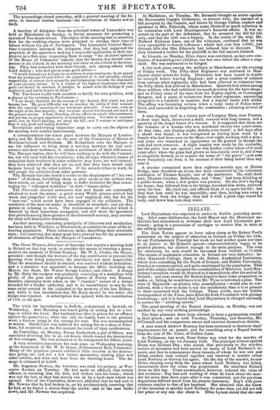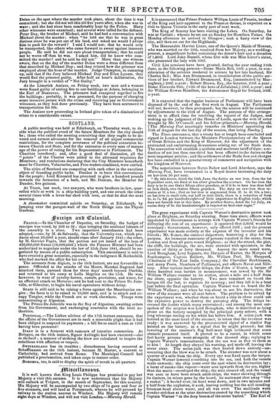IRELAND.
Lord Heytesbury was expected to arrive in Dublin yesterday morn- ing. After some deliberation, the Lord Mayor and the Municipal au- thorities had determined to welcome their new Lord Lieutenant gra- ciously; going in a procession of carriages to receive him in state at the railway-terminus.
The Irish Tories appear to have taken alarm at Sir Robert Peel's statements on the subject of education in Ireland, on Friday the 19th. In our Parliamentary Postcript last week we had neither space nor time to do justice to Sir Robert's speech—characteristically vague in its positive phrases, but distinct enough in the main purpose. The vote for education, he said, would be increased from 50,0001. to 75,000T. The means of academical education in Ireland are very defective : be- sides Maynooth College, there is the Belfast Academical Institution, which does something for the North of Ireland ; and Dublin University, founded at a remote period, and quite outstripped by the population. That part of the subject had occupied the consideration of Ministers. Lord Hey- tesbury's attention would be directed to it immediately after his arrival in Ireland ; and next session Sir Robert hoped to have some proposition to make, or, failing, he would leave it to Mr. Wyse to introduce a plan. The state of Maynooth—at present very unsatisfactory—would also be con- sidered, with a view to make it not less satisfactory than it is at present to those connected with the College. These words, says the Dublin correspondent of the Times, have filled the Irish Protestants with gloomy forebodings ; and it is feared that Lord Heytesbury is charged zealously to pursue the " soothing system."
The usual meeting of the Repeal Association, on Monday, was not marked by any very striking proceedings.
The State prisoners have been allowed to have a gymnasium erected in their prison ; and on each Tuesday, Thursday, and Saturday, Mr. O'Connell and his companions amuse and exercise themselves therein.
A man named Andrew Kearney has been sentenced to fourteen days' imprisonment for an assault. and for snatching away a Repeal button. from the coat of Mr. Clare, of Golden Lane.
At Tullamore, last week, Peter Dolan was tried for the murder of Lord Norbury, on the 1st January 1839. The principal witness against Dolan was Michael Day ; who stated, that previously to the murder, notices of ejectment had been served on many of Lord Norbury's te- nants, and that in consequence those tenants, of whom he was one and Dolan another, took counsel together and resolved to murder either Lord Norbury or Garvey his agent. On the day of the murder, he saw Dolan running away from the place where Lord Norbury was killed, immediately after the crime was perpetrated. He described Dolan's. dress on that day. Cross-examination, however, reduced the value of this evidence : Day had said nothing of what be knew about the mur- der for more than three years after it was committed, and his previous depositions differed much from his present statement. Day's wife gave- evidence similar to that of her husband. She admitted that she knew, of the intention to murder Lord Norbury for some time, yet did not tell her priest or any one else Sheet it. Ellen Lynam stated that she saw.
Dolan on the spot where the murder took place, about the time it was committed ; but she did not tell this till five years after, when she was in want ; and she had since been comfortably kept by the Police. Many other witnesses were examined ; and several were called for the defence. Peter Day, the brother of Michael, said he had had a conversation with Michael shoat the murder; when "he told me that he was in great distress since he was put out of his land, and asked me would I advise him to push for the reward ? I said I would not; that he would only be transported, like others who came forward to swear against innocent people. He said he did not care about transportation ; that he could not be worse off than he was. I asked him, did he know who coat- witted the murder? and he said he did not." More than one witness swore, that on the day of the murder Dolan wore a dress different from that described by Michael Day ; and they related how the prisoner was employed about the hour of the murder. Judge Crampton, in summing up, said that if the Jury believed Michael Day and Ellen Lynam, they would find the prisoner guilty. After half an hour's deliberation, the Jury brought in a verdict of "Not Guilty."
At the Limerick Assizes, on Friday week, two men and a woman were found guilty of setting fire to out-buildings at Adare, belonging to the Earl of Dunraven. The prisoners had conspired together to fire the buildings ; probably, it was presumed, for the purpose of charging some innocent person with the crime and receiving pay as Government witnesses, as they had done previously. They have been sentenced to transportation for life.
The Assizes now proceeding in Ireland give token of a diminution of crime to a considerable extent.



























 Previous page
Previous page